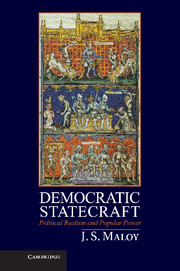4 - From Aristotle to Machiavelli
Democracy Bites
Published online by Cambridge University Press: 05 March 2013
Summary
Erudition, noun. Dust shaken out of a book into an empty skull.
Ambrose Bierce, The Devil’s DictionaryBy the Middle Ages the extended family of Christendom included both Plato and Aristotle. Though ludicrous in itself, the arranged marriage of Peter, Paul, and Jesus with dead pagan philosophers had important consequences: it’s arguably been responsible for many of the ideals that modern Europeans and their cultural heirs have been inclined to call “humane” and “civilized.” But there was collateral damage along the way, as Plato and Aristotle themselves were often distorted and manipulated. One particularly consequential marvel of this type was the Platonization of Aristotle: in order for both to be proto-Christians, they were often fused into one; and, since Plato was easier to depict as a proto-Christian than his pupil, the latter was often twisted to fit the former.
The analysis of the nature and distribution of power was only a small part of this process, but an important element of the Western tradition of statecraft was formed in reaction against it in Renaissance Italy. There the Platonized version of Aristotle was being dismantled, as were various other intellectual frauds of the Christian era. One clue to what was happening lies in the fact that the complete works of Plato were only translated into Latin, the language of science and literature for all of Europe, in the later fifteenth century. Previously readers unfamiliar with ancient Greek got a good deal of their Plato from intermediary sources, including Christian ones. But by the turn of the century it was becoming clear that the faulty formula of a Platonized Aristotle couldn’t keep the medieval Christian system of ideas well nourished, and the genuine article, Plato himself, was needed instead.
- Type
- Chapter
- Information
- Democratic StatecraftPolitical Realism and Popular Power, pp. 73 - 109Publisher: Cambridge University PressPrint publication year: 2013



